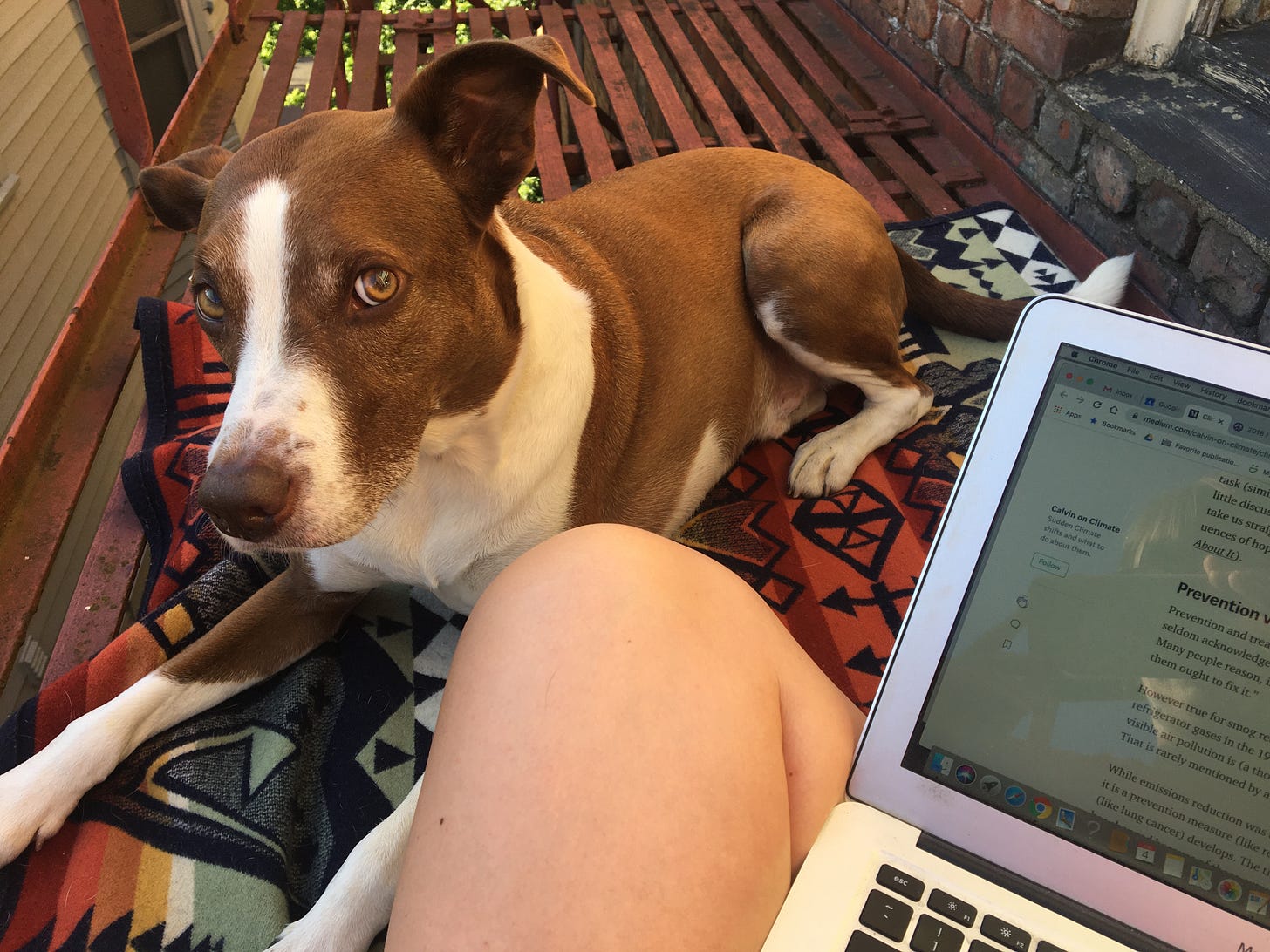Hi, writer friends,
Welcome to One More Question, a newsletter for freelance writers who want to keep doing the work, even when it’s really hard. This issue is free so feel free to share it around! If you’re interested in hearing from me more regularly, consider signing up for the paid subscription which includes weekly advice, essays on writing, pitch calls, grants, classes, and all kinds of opportunities for writers.
Here’s what we have going on today:
How and why to charge more for writing
Some new writer resources you should know about
Recommendations of the week
Editors who want your pitches
Why You Should Really Charge More

(Because Jackson says you should. Image: My dog staring at me while I write on my laptop.)
A cynical chuckle introduced a line I’ve heard so many times.
“I don’t even make that much,” he said. He was the founder of a startup, and we were discussing the hourly rate they would pay me for editing and writing for their website.
I put a lot of thought into how much I should ask for, and I gave myself a little pep talk in the rearview mirror of my car prior to this meeting. But I also knew I’d take whatever he offered. I needed this job. And his incredulity stripped me of any confidence. Even though the rate I proposed was still lower than I should have been charging for my years of experience and skill, I felt embarrassed at having suggested it. I took what he offered. Smiled and shook his hand.
If you haven’t had that line used on you yet—brace yourself. It’s coming.
“That’s more than I make!” they’ll tell you.
But if you’re charging for freelance writing services, and you’re not receiving health insurance, paid time off, work tools, office space, or a million other things that any full-time employee enjoys, then there is nothing crazy about charging more than an employee is making—even more than the boss. The person paying you is saving a lot of money by not providing those employee perks. So you should charge them more.
You have to, actually.
It took me many years of freelancing to realize those crazy high rates that other writers were charging really aren’t crazy at all. And if I ever wanted to stop relying on credit cards and also have a life, I would need to start making a lot more money.
None of us got into writing for the money. But also, none of us can focus on writing and produce our best work if we’re constantly stressed out about money.
We are all worthy of lives that feel comfortable and sustainable. And we have to start asking for the rates that support that. I know it’s getting harder and harder out there. But if we all keep pushing for more, I know we can all still find it.
So here’s a little math exercise that will help you figure out how to charge without feeling weird or guilty about it. There are many different approaches to determining what to charge, but I find this one works well for me.
How many billable hours do you want to work each day?
I want to work about 4 hours a day on billable writing work. That might seem like an easy breezy work schedule, but consider the time you spend on looking for work, pitching, corresponding with editors, invoicing, expense tracking, reading, networking, and a million other things we don’t get paid for.
I also want to leave time for work that doesn’t immediately make me money. Like writing a book or this newsletter.
So, what’s your number of billable hours a day?
How many days a year do you want to work?
There are 262 working days in the 2020 calendar year. Let’s subtract 20 for some holidays, vacation, and sick days. That leaves 242 days to work.
(Yes, yes, I know most of us freelance writers rarely take real vacations and often work weekends. But we’re talking GOALS. And my goal is to work less. Give yourself a break.)
242 x 4 = 968 working hours in the year.
How much do you want to make?
My goal this year is 70K. (Then a pandemic happened, and well, shoot. But again, we’re talking goals here. Shoot high.)
How much do you want to make?
Now divide that by the number of working hours above.
For me that’s 70,000 / 968 = 72.31
So I should charge about $72/hour.
But wait! We forgot taxes, which are higher for freelancers than employees. And since I’m a writer and refuse to do any more math, let’s just round that up to $80/hour.
Now of course, you’re not always going to charge hourly. (If you can avoid charging hourly, I’d recommend it.) For journalism work, you’ll probably be paid by the word or by the project. For clients, you might charge a monthly retainer. But knowing this number will still give you a good idea of how much you should be making for your time, regardless of the format through which that is determined.
It’s not easy to start asking for more. But here’s another reason to do so that might make it easier:
You’re not just asking for you. You’re asking for all of us.
When you negotiate for a higher rate, whether it’s an article for a magazine or a project for a client, you’re making it easier for all of us to build a sustainable career out of writing.
Consider that not everyone is in a position to demand more. Some people are just trying to feed their kids and taking whatever work they can get. Others are just getting started and they don’t have the clips or the contacts or the confidence to ask for higher rates yet. The responsibility to uphold higher rates for our industry should not be put on writers in those positions. (And there is no shame in being in that position. We’ve all been there.)
So if you can, ask for more for anyone who can’t. Ask for more for the version of you that once sat in a cafe with a soon-to-be-boss and turned bright red when he made her feel like she was asking for way too much.
Ask for more for all those years you worked for free—and hopefully by making more and becoming a successful writer, you’ll inspire another writer to never work for free.
They deserve more. You deserve more. And writing is fucking hard by the way. Ya know?
You know.
(They know, too. And that’s why they need you.)
We’re all in this together. So if you’re ever looking for a pep talk before those negotiations happen, shoot me an email. I am by no means an expert negotiator. But I’m happy to encourage you to ask for more and talk about how much. Because when you win, I win, too. We all do.
New Resources for Writers
Writers are building great things for fellow writers lately. I love that. Here are a few you should know about:
Bizzy Coy’s Super Secret Guide to Freelance Copywriting is packed with actionable advice for the kind of writing work I don’t often focus on here—but really, it’s where the money’s at.
Abby Lee Hood shares Pitches That Worked, a handy resource to get a feel for what kind of pitch emails actually turn into published stories.
PEN America is offering free webinars on everything you should know about covering protests.
The Black Journalists Therapy Relief Fund is designed to offer financial assistance to Black journalists facing hardships during this difficult time. Non-black writers, consider donating if you’re able to. Applications for funding are currently closed, but sign up here to find out when they reopen.
Reads (and a listen) of the Week
“Many of Didion’s sentences resemble my favorite music, music no one should dance to. She modeled how writing yourself into the story of a place convinces readers that the place is yours. You, the author, fuse with rhetoric and fact. Your body joins the topography.” It’s Time to Take California Back From Joan Didion (Electric Lit)
“What I’ve found interesting, among a torrent of interesting things, in the week of excavation of the racist, toxic workplace at Bon Appétit, is how it shows that food media work can exploit all those notions and combine them with the worst of passive-aggressive, hierarchical corporate culture obsessed with perception and metrics and a specifically gentrified-Brooklyn concept of cool.” On Media (From the Desk of Alicia Kennedy)
I’m on the Mudlark podcast this week! Listen in on a very candid conversation about how I made the leap from full-time editor to freelance writer. I also talk about this newsletter.
Editors Who Want Your Pitches

















That’s it for now, friends! I’ll be back in your inbox on Friday with a Q&A.
In the meantime, it would mean so much to me if you shared this issue with a writer friend. 💛



